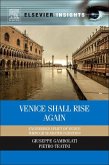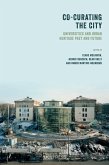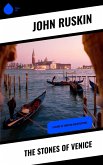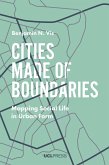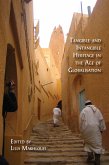From the myth of Arcadia through to the twenty-first century, ideas about sustainability - how we imagine better urban environments - remain persistently relevant, and raise recurring questions. How do cities evolve as complex spaces nurturing both urban creativity and the fortuitous art of discovery, and by which mechanisms do they foster imagination and innovation? While past utopias were conceived in terms of an ideal geometry, contemporary exemplary models of urban design seek technological solutions of optimal organisation. The Venice Variations explores Venice as a prototypical city that may hold unique answers to the ancient narrative of utopia. Venice was not the result of a preconceived ideal but the pragmatic outcome of social and economic networks of communication. Its urban creativity, though, came to represent the quintessential combination of place and institutions of its time.
Through a discussion of Venice and two other works owing their inspiration to this city - Italo Calvino's Invisible Cities and Le Corbusier's Venice Hospital - Sophia Psarra describes Venice as a system that starts to resemble a highly probabilistic 'algorithm'. The rapidly escalating processes of urban development around our big cities share many of the motivations for survival, shelter and trade that brought Venice into existence. Rather than seeing these places as problems to be solved, we need to understand how urban complexity can evolve, as happened from its unprepossessing origins in the marshes of the Venetian lagoon to the 'model city' enduring a 1000 years. This book frees Venice from stereotypical representations, revealing its generative capacity to inform potential other 'Venices' for the future.
Praise for The Venice Variations
'An imaginative and ambitious account of urban development and the architect's means of engagement with it. The text is expansive, offering a virtuoso display of different modes of knowing. ... Both a history and a proposed methodology, a concatenation of erudition and imagination. ...What is the relevance of an architectural imagination that does not engage with such social and political concerns. The book certainly suggests why it would be important for it to do so.'
Buildings & Cities
'The beautifully designed book fulfils a dreamy mission of aggrandizing the titular city's history and beauty while recognizing its fragility and potential demise because of climate change and overcrowding from tourists and their marine vehicles ... Psarra deals very carefully with the history of Piazza San Marco and its central position in civic and religious interpretations of the city.'
The Architect's Newspaper
'The book shows us the value of doing diachronic history. We see how useful it is to learn about twentieth-century architecture along with Renaissance spaces. Similarly, we see the value in a truly multi-disciplinary history in which Calvino and Le Corbusier are on equal footing. In all of this, we must wonder how history can be more creative and provocative. As Psarra shows, there is a lot we can learn from Venice.'Modern Italy
'A visual treat that is made more accessible and meaningful through the diagrams.'A Daily Dose of Architecture Books
'Psarra animates the city as a creature that is based on the dialogue between anonymous collective and branded individual imagination. It reconstitutes the principles and ways of thinking that allowed Venice to act as a source of inspiration... It shows us how the natural city, and its mythological plots that we have in our minds, are being embodied in an open creativity. The book can be purchased in classic print or purchased electronically at no cost.' Smells Like Urban Spirit (SLUS)
Through a discussion of Venice and two other works owing their inspiration to this city - Italo Calvino's Invisible Cities and Le Corbusier's Venice Hospital - Sophia Psarra describes Venice as a system that starts to resemble a highly probabilistic 'algorithm'. The rapidly escalating processes of urban development around our big cities share many of the motivations for survival, shelter and trade that brought Venice into existence. Rather than seeing these places as problems to be solved, we need to understand how urban complexity can evolve, as happened from its unprepossessing origins in the marshes of the Venetian lagoon to the 'model city' enduring a 1000 years. This book frees Venice from stereotypical representations, revealing its generative capacity to inform potential other 'Venices' for the future.
Praise for The Venice Variations
'An imaginative and ambitious account of urban development and the architect's means of engagement with it. The text is expansive, offering a virtuoso display of different modes of knowing. ... Both a history and a proposed methodology, a concatenation of erudition and imagination. ...What is the relevance of an architectural imagination that does not engage with such social and political concerns. The book certainly suggests why it would be important for it to do so.'
Buildings & Cities
'The beautifully designed book fulfils a dreamy mission of aggrandizing the titular city's history and beauty while recognizing its fragility and potential demise because of climate change and overcrowding from tourists and their marine vehicles ... Psarra deals very carefully with the history of Piazza San Marco and its central position in civic and religious interpretations of the city.'
The Architect's Newspaper
'The book shows us the value of doing diachronic history. We see how useful it is to learn about twentieth-century architecture along with Renaissance spaces. Similarly, we see the value in a truly multi-disciplinary history in which Calvino and Le Corbusier are on equal footing. In all of this, we must wonder how history can be more creative and provocative. As Psarra shows, there is a lot we can learn from Venice.'Modern Italy
'A visual treat that is made more accessible and meaningful through the diagrams.'A Daily Dose of Architecture Books
'Psarra animates the city as a creature that is based on the dialogue between anonymous collective and branded individual imagination. It reconstitutes the principles and ways of thinking that allowed Venice to act as a source of inspiration... It shows us how the natural city, and its mythological plots that we have in our minds, are being embodied in an open creativity. The book can be purchased in classic print or purchased electronically at no cost.' Smells Like Urban Spirit (SLUS)
Dieser Download kann aus rechtlichen Gründen nur mit Rechnungsadresse in A, D ausgeliefert werden.



